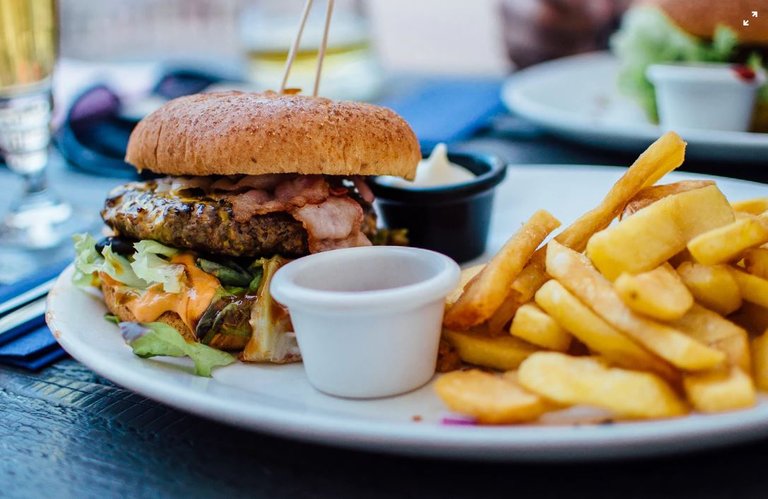"Women who eat junk food such as burgers or pizza are increasing their risk of cancer even if they're not overweight, new research has warned," reports the Daily Mail.
The story is based on research from the US looking at the diet of postmenopausal women in the 1990s and then tracking the development of a variety of cancers over about 15 years.
"Junk food" is often defined as food that is rich in calories (energy dense food) but low in nutrients.
Having a diet high in energy dense foods, such as biscuits, chocolate and pizza was found to increase the risk of cancer in these women, specifically in those of a healthy weight, which was defined as having a body mass index (BMI) of between 18.5 and 24.9. This suggests that having a healthy weight does not necessarily protect against cancer risk.
However the connections between diet, lifestyle and cancer outcomes are complex, and while the researchers attempted to adjust their results for other factors, we cannot say with certainty that energy dense foods increase your cancer risk.
The analysis was limited to postmenopausal women and did not consider drink intake, such as sugary drinks and alcohol, which can also be high in calories.
Still, having a healthy, balanced diet will help you get all the nutrients you need and may reduce your risk of developing cancer.
Where did the story come from?
The study was carried out by researchers from the Mel and Enid Zuckerman College of Public Health, the University of Arizona, the University of Iowa, Purdue University, Albert Einstein College of Medicine, Kaiser Permanente Center for Health Research, Harbor-UCLA Medical Center and the University of California, all in the US.
The research was funded by the National Cancer Institute of the National Institutes of Health and The University of Arizona Collaboratory for Metabolic Disease Prevention and Treatment. The Women's Health Initiative (WHI) from which data was sourced is funded by the National Heart, Lung, and Blood Institute; National Institutes of Health; and US Department of Health and Human Services.
The study was published in the peer-reviewed Journal of the Academy of Nutrition and Dietetics.
The UK media's reporting of this US study was generally accurate, although it could have been more explicit about the fact that all women in the study were postmenopausal, meaning the results might not be applicable to all populations.

Electrolyte Concentrate for Rapid Hydration | NO Calories NO Sugar
https://bit.ly/2Bpt7sq
What kind of research was this?
This was a prospective cohort study, meaning it looked at a large number of women over a number of years, with the aim of finding out if consuming energy dense foods increases the risk of cancer.
Cohort studies such as this are good at looking at trends in large numbers of people over time but cannot on their own prove cause and effect unless the links are strong and consistent.
It cannot be proven from this research that having an energy dense diet will result in increased risk of cancer.
What did the research involve?
The researchers took data from 92,295 women participating in the Women's Health Initiative (WHI) study in the US, a longitudinal study involving healthy, postmenopausal women recruited between 1995-1998 who were between 50 and 79 years old.
The association between an energy dense diet and cancer was investigated over an average 14.6 year follow up period.
The researchers excluded women who had a history of cancer, and those with a lack of dietary data, missing BMI data, or who reported consuming fewer than 600 calories or more than 5,000 calories per day.
Diet was assessed by self-report at the start of the study using a food frequency questionnaire designed to estimate energy, nutrients and food weight.
Dietary energy density (DED) was calculated by dividing the daily energy intake (in kilocalories) from foods (but not drinks) by the portion size reported and corresponding weight in grams of these foods, as per the WHI database.
Cancer assessment at the start of the study was by self-report by participating women and then by self-report on a biannual basis at follow up, with the results also checked against medical records.
Obesity-related cancers were the outcome of interest and were defined using the American Institute of Cancer Research report of diet, physical activity, and cancer. Common obesity-related cancers include breast, colorectal and kidney cancers.
Analysis took into account potentially confounding variables, including:
age
ethnicity
neighbourhood socioeconomic status
smoking history
physical activity
disease history
weight change pattern in adulthood
alcohol
hormone use and use of disease-related medications
BMI and waist circumference were also measured.
What were the basic results?
The total number of women with cancer over the follow up period was 9,565. This included:
5,565 cases of breast cancer
1,639 cases of colorectal cancer
662 cases of ovarian cancer
955 cases of endometrial cancer
347 cases of renal cancer
461 cases of gallbladder cancer
485 cases of oesophageal cancer
620 cases of pancreatic cancer
Among 28 analyses across two models the risk of any obesity-related cancer was 10% higher in one analysis for the women consuming the highest energy dense diet compared with the lowest (subhazard ratio (sHR) 1.10, 95% confidence interval [CI] 1.03 to 1.20).
After accounting for confounders, energy dense diets were not significantly associated with each individual cancer type.
When breaking down into BMI subgroups, only women of a normal weight (BMI < 25) had a positive association between energy dense diets and obesity-related cancer. Those in the highest three quintiles for energy dense diets had a 10%, 18% and 12% increased risk of obesity-related cancer for quintiles 3, 4 and 5 (sHR trend 1.2, significance not reported).
Higher energy dense diets were associated with higher BMI (29.0 ± 6.0 versus 26.3 ±4.9 for quintile 5 versus 1).
How did the researchers interpret the results?
The researchers concluded that "among normal-weight women, higher Dietary Energy Density may be a contributing factor for obesity-related cancers. Importantly, Dietary Energy Density is a modifiable risk factor. Nutrition interventions targeting energy density as well as other diet-related cancer preventive approaches are warranted to reduce cancer burden among postmenopausal women."
Conclusion
Energy dense diets appear to be associated with a 10% increased risk of obesity-related cancer in those eating the top 205 high density food types.
A sub analysis of postmenopausal women of normal, overweight or obese weight at the start of the study showed a link specifically in those of a normal weight and a weaker link in those who were overweight or obese.
The authors suggest these findings mean weight management alone might not protect against obesity-related cancer if women have a high energy dense diet.
Although this was a longitudinal study involving a large sample of women, it has some limitations:
Food intake was self-reported and so might not accurately represent what women were truly eating as there is a tendency to under-report in such questionnaires.
There are a range of other factors that might have contributed to the increased risk of cancer that were not accounted for in analysis, such as whether the participants were employed, the type of employment, home life and social factors, levels of activity, as well as consumption of energy dense drinks (which were not considered in the food questionnaire).
Women consuming lower amounts of energy dense food tended to have a lower BMI, engage in more physical activity and consume less alcohol and tobacco, indicating that healthy behaviours cluster together and are hard to unpick.
Research was limited to postmenopausal women aged 50 to 79 in the US so might be less relevant to women of other ages or women in the UK where food types and eating trends might differ.
Eating a lot of energy dense foods is not recommended as part of a healthy lifestyle as it increases the risk of becoming overweight due to the high number of calories these foods contain.
To cut down on energy dense foods, aim for balanced diet and try these healthy food swaps.

Hi! I am a robot. I just upvoted you! I found similar content that readers might be interested in:
https://www.nhs.uk/news/cancer/junk-food-may-increase-cancer-risk-healthy-weight-women/
Congratulations @jeniearanas! You received a personal award!
You can view your badges on your Steem Board and compare to others on the Steem Ranking
Vote for @Steemitboard as a witness to get one more award and increased upvotes!